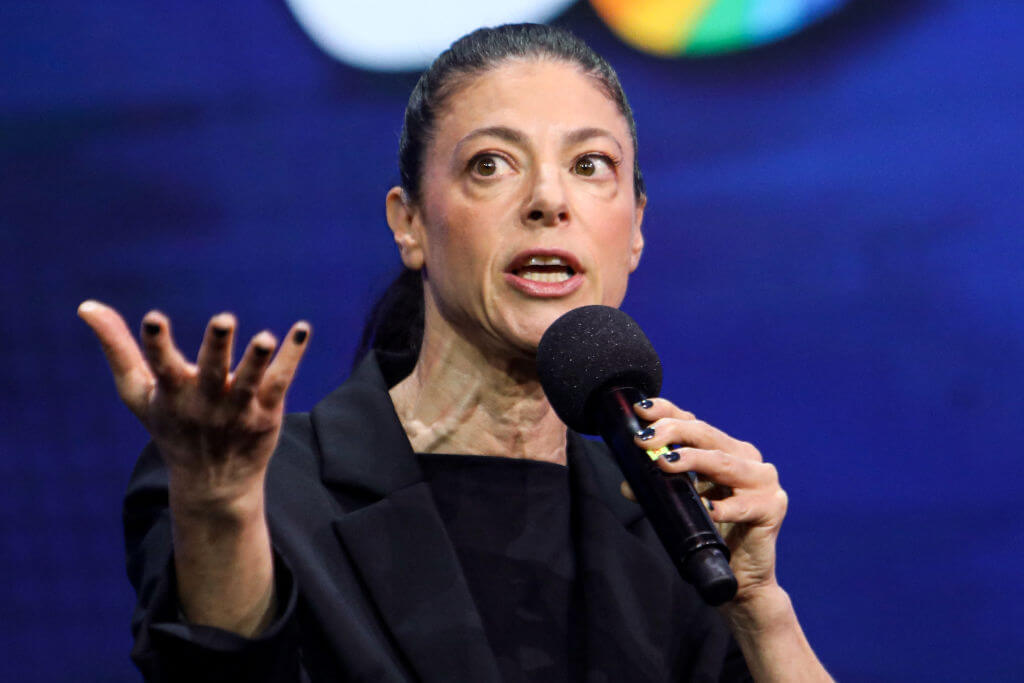Fighting for political survival, Labor chief wants American Jews to help rebuild liberal Zionism
MK Merav Michael called the massive protests against the government’s judicial overhaul plan a ‘huge opportunity’ for the Israeli left

Merav Michaeli, Israel’s Labor party chief, on Oct. 20, 2022. Photo by GIL COHEN-MAGEN/AFP via Getty Images
As Israelis celebrate the 75th anniversary of the nation’s declaration of independence, Israel’s founding party is on the brink of collapse. The party has only four seats in the 120- member Knesset, and in recent months has consistently polled below the 3.25% threshold that would allow it any seats were parliamentary elections held today.
But Labor chairwoman Merav Michaeli, fighting for her own political life, said she isn’t worried, and points to the massive pro-democracy movement that has spread across Israel in recent months, a response to the right-wing government’s judicial overhaul plan, which critics say would demolish Israel’s balance of powers. Michaeli also looks outside Israel, to American Jews, for help rebuilding the liberal Zionist camp.

“The future of Israel depends on its going back to the Zionist vision,” she said during a recent visit to the U.S. “And our side of the political map must rebuild its political power, build the infrastructure that it doesn’t have today to reach people’s hearts and minds.”
But public opinion polls do not predict a liberal resurgence in Israel, and point to the centrist-right party, the National Unity led by former defense minister Benny Gantz, as the only viable alternative to the right-wing government.
Michaeli, who came to the U.S. this spring for personal reasons — her second son was born via surrogacy — during the Knesset’s April recess, also made time to meet with senior administration officials, members of Congress and Jewish leaders. She also spoke at the weekly Sunday morning protest organized by Israeli expats in Manhattan’s Washington Square Park.
“I think post 2016, Americans should realize what we are up against,” she said, referencing the election of Donald Trump. “There are many similarities between what Netanyahu does and what Trumpism does. It’s the same values that are at stake.”
Who is Michaeli?
Michaeli, 56, a former journalist and staunch feminist, was elected to head the beleaguered Labor Party in 2021 after several failed merger attempts with other left Zionist parties. It was seen as a glass-ceiling moment — she is the third woman since former Prime Minister Golda Meir to lead Israel’s founding party. She took office during a brief period of hope for the center-left bloc, when it — with help from right-leaning forces also hostile to Prime Minister Benjamin Netanyahu — succeeded in temporarily ousting him from power after 12 consecutive years.
Labor won just seven seats in that election, but Michaeli became a leading partner and minister of transportation in the “change” government led by Naftali Bennett. The coalition fell apart a year later and in last year’s elections, Labor barely crossed the threshold, claiming four seats. Labor’s modest victory also came with a price, for which Michaeli was widely blamed. Its partner on the left, Meretz, didn’t win enough votes to gain any seats in the Knesset, thus contributing to the expanded majority that allowed Netanyahu to form a stable right-wing majority government after four failed attempts.
Michaeli expressed no regrets. She maintained that previous mergers with Meretz had resulted only in a loss of support for Labor and that she could not again take that risk.
“I was elected twice to the chair of the party by promising one thing: to rebuild Labor,” she said. “What I have promised I delivered. Labor is the only Zionist democratic party in the parliament.”
At least two Labor members — Gilad Kariv and Naama Lazimi — have challenged Michaeli’s leadership in recent months, urging her to quit and call early elections for chair or consider a merger with Meretz. Michaeli’s position among party members remains uncertain. A recent poll conducted by Israel’s Channel 12 showed 41% of people who voted for Labor last year want her to stay and 39% want her to resign.
Fighting for the future
Michaeli said she sees “a huge opportunity” for the left to leverage the protests rocking Israel to boost its political power. She said it’s up to liberal Zionist leaders to “crack this bubble of delegitimization that was made to the word ‘left’ and everything that is identified with it.” She cited opinion polls that show most Israelis want peace, believe in religious pluralism and worry about socioeconomic inequality.
She traced the current political upheaval in Israel back decades, noting previous attacks on the independence of the Supreme Court by the settler movement and Haredi parties, who objected to rulings about gender equality and the military draft, among other issues.
Labor is not party to current talks hosted and mediated by President Isaac Herzog to reach a compromise on judicial reform.
“It all depends on the content of the compromise,” she said when asked if she’d support a watered-down version of the proposal. “If it’s something that we think is good for the state of Israel and for its democracy, then we’ll always support it. But if it’s something that we think risks our democracy, we will vote against it.”
Regardless of the outcome, she said the Israeli left should learn something from the way the Israeli right has relied on a global network, and the backing of American donors in particular, to build political power and pursue its agenda. The left, she said, lacks such a network.
“We need our American allies to help us rebuild,” Michaeli said.
The Forward is free to read, but it isn’t free to produce

I hope you appreciated this article. Before you go, I’d like to ask you to please support the Forward.
Now more than ever, American Jews need independent news they can trust, with reporting driven by truth, not ideology. We serve you, not any ideological agenda.
At a time when other newsrooms are closing or cutting back, the Forward has removed its paywall and invested additional resources to report on the ground from Israel and around the U.S. on the impact of the war, rising antisemitism and polarized discourse.
This is a great time to support independent Jewish journalism you rely on. Make a gift today!
— Rachel Fishman Feddersen, Publisher and CEO
Support our mission to tell the Jewish story fully and fairly.
Most Popular
- 1

Fast Forward Ye debuts ‘Heil Hitler’ music video that includes a sample of a Hitler speech
- 2

Opinion It looks like Israel totally underestimated Trump
- 3

Culture Cardinals are Catholic, not Jewish — so why do they all wear yarmulkes?
- 4

Fast Forward Student suspended for ‘F— the Jews’ video defends himself on antisemitic podcast
In Case You Missed It
-

Culture How one Jewish woman fought the Nazis — and helped found a new Italian republic
-

Opinion It looks like Israel totally underestimated Trump
-

Fast Forward Betar ‘almost exclusively triggered’ former student’s detention, judge says
-

Fast Forward ‘Honey, he’s had enough of you’: Trump’s Middle East moves increasingly appear to sideline Israel
-
Shop the Forward Store
100% of profits support our journalism
Republish This Story
Please read before republishing
We’re happy to make this story available to republish for free, unless it originated with JTA, Haaretz or another publication (as indicated on the article) and as long as you follow our guidelines.
You must comply with the following:
- Credit the Forward
- Retain our pixel
- Preserve our canonical link in Google search
- Add a noindex tag in Google search
See our full guidelines for more information, and this guide for detail about canonical URLs.
To republish, copy the HTML by clicking on the yellow button to the right; it includes our tracking pixel, all paragraph styles and hyperlinks, the author byline and credit to the Forward. It does not include images; to avoid copyright violations, you must add them manually, following our guidelines. Please email us at [email protected], subject line “republish,” with any questions or to let us know what stories you’re picking up.
















